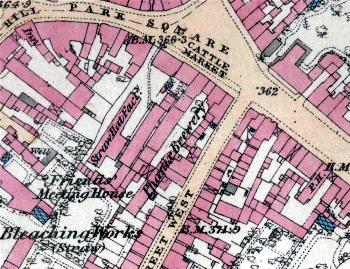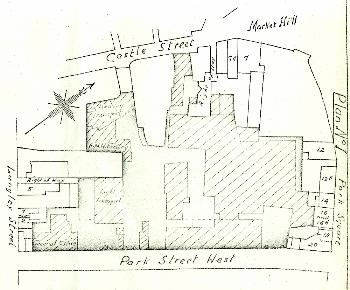![The Phoenix Brewery around 1900 [WB/Green4/5/Lu/PSWB1]](/CommunityHistories/Luton/LutonImages/The Phoenix Brewery in 1900 WB-Green4-5-Lu-PSWB1.jpg)
The Phoenix Brewery around 1900 [WB/Green4/5/Lu/PSWB1]
When the words Luton and industry are mentioned people normally think of hats or Vauxhall Motors. However, until the latter part of the 20th century brewing was also a very important industry in the town although now defunct. There have been four large breweries in the town over the years: Burr's Brewery in Park Street, the Crown and Anchor Brewery in New Bedford Road, the Phoenix Brewery in Park Street West and the Whitbread Brewery in Oakley Road.
![Adams Yard around 1900 [WB/Green4/5/Lu/PSWB2]](/CommunityHistories/Luton/LutonImages/Adams Yard around 1900 WB-Green4-5-Lu-PSWB2.jpg)
Adams Yard around 1900 [WB/Green4/5/Lu/PSWB2]
The Phoenix Brewery has its genesis in a house in Park Street, described as fronting Cross Pond. The house had a malting, malthouse and kiln and in 1816 was conveyed by Daniel Brown of Luton to William Adams of Luton, baker.[WB/Green4/1/Lu/BreweryPSW1]. Interestingly there was already a malting on the site - as the photograph above shows. Whitbread archivist Nick Redman has written on the back of the photograph: "Part of the Brewery buildings (still there September 1986) once known as Adams' Yard". The date just beneath the roof is 1797.
In 1847 Edward Chase conveyed to Adams three poles of land, part of a house called Langleys and with a frontage of 39 feet 6 inches to Park Street West and 40 feet to Adams' yard [WB/Green4/1/Lu/BreweryPSW1]. In his will of 1851 Adams devised the house and land to his wife and, after her death, to his children [WB/Green4/1/Lu/BreweryPSW1]. He died in 1853 and on 18th January the next year his wife and children sold the house to Henry Pearman, wine merchant and brewer for £1,650 [WB/Green4/1/Lu/BreweryPSW1].
On Christmas Eve 1859 Henry Pearman conveyed the house with a brewery, storehouses and offices "recently erected by Henry Pearman on the site of a malt kiln" along with a stable, gateway and yard fronting Park Street West to the premises' occupier Frederic Pearman of Luton, brewer, for £1,700 [WB/Green4/1/Lu/BreweryPSW12]. William Austin, in his 1928 History of Luton, noted that the Pearman brothers, Frederick and Henry built the brewery behind their wine and spirit business in Castle Street and that they also took over a maltster's business belonging to James Cook in Market Hill on his death. The deeds, however, imply that Frederic Pearman was the brewer and Henry the wine merchant.
On 23rd December 1868 Frederic Pearman agreed to sell the brewery to John William Green. He was a twenty two year old who had benefited from the will of his grandfather, local Quaker John Foster, who had died in 1864. He had joined Pearmans in 1863, two years after leaving school, aged fourteen [WB/Pearman7/2/2]. The inventory and valuation by Richard Moss of the brewery's stock in trade, plant, utensils, casks, horses, drays and other effects, fixtures and so on [WB/Pearman/4/1/VP1] put a value of £1,614/6/- on the business, which included, besides the brewery, six tied houses: the Plume of Feathers, Guildford Street; the Yarmouth Arms, Park Street; the Brewers Arms, New Town Street; the Sportsman, Houghton Regis; the Red Lion, Studham and the Harrow, Kinsbourne Green, Harpenden [Hertfordshire], besides Frederick Pearman's house in Park Square and a cottage in Limbury.

The Phoenix Brewery shown on an Ordnance Survey map of 1880
Green bought the business on 1st July 1869 for £440 whilst it was still subject to a mortgage for £2,000 to Charles Greenwood, a Berkshire farmer, the price thus being £2,440 [WB/Green4/1/Lu/BreweryPSW7]. The public houses were not part of the sale, just the house in Park Street, the brewery, garden behind the brewery with "store houses, greenhouse and shed lately erected by Frederic Pearman" and the stable, yard and gateway fronting Park Street West. Green repaid Greenwood's mortgage on 30th December that year. The wine and spirit business was not part of the sale and, presumably, continued to be owned and run by Henry Pearman. Green later, in 1875, acquired Wadsworth and Thaire's brewery in Market Hill [WB/Pearman7/2/2].

Site layout plan of the Phoenix Brewery about 1897 [WB/Green4/4/Lu1] to see a larger picture please click on the image above
By 1897 J. W. Green was ready to form a limited company which he did on 29th September that year, just after taking over the firm of his competitor Thomas Sworder in Luton. When the company was set up it had ninety sixlicensed premises. These were made up of thirty eightwhich had been Green's and fifty eightwhich had been Sworder's. The former Green premises were: as follows:
- Arlesey: the True Briton, Back Street;
- Edlesborough [Buckinghamshire]: the Prince of Wales;
- Gosmore, Saint Ippollitts [Hertfordshire]: the Red Cow [exchanged for the Victoria, Sun Street, Baldock [Hertfordshire] in 1925]
- Hitchin [Hertfordshire]: the Albert, Walsworth Road;
- Hitchin: the Sugar Loaf, Back Street;
- Houghton Regis: the Cock;
- Kensworth: the Packhorse;
- Luton: the Burton Arms, Collingdon Street;
- Luton: the Bute Arms, Collingdon Street;
- Luton: the Duke of Edinburgh, on the corner of Stuart Street and Princes Street;
- Luton: the Eight Bells, Church Street;
- Luton: the Engine, Bute Street;
- Luton: the Enterprise, Elizabeth Street;
- Luton: the Falcon, Park Street;
- Luton: the Granville, Cheapside;
- Luton: the Hearts of Oak, Vicarage Road;
- Luton: the North Star, on the corner of North Road and Dudley Street;
- Luton: the Phoenix, New Town Street;
- Luton: the Plume of Feathers, Guildford Street;
- Luton: the Queens Head, Chapel Street;
- Luton: off-licence at 30 cardigan Street;
- Luton: off-licence on the corner of Court Road and Vicarage Road;
- Luton: off-licence at 8 Dudley Street;
- Luton: off-licence at 43 Duke Street;
- Luton: off-licence at 73 High Town Road;
- Luton: off-licence at 11 Hitchin Road;
- Markyate Street [Hertfordshire]: the Bull and Butcher;
- Northall [Buckinghamshire]: the Swan;
- Pirton [Hertfordshire]: the White Horse;
- Preston [Hertfordshire]: the Red Lion;
- Redbourn [Hertfordshire]: the Queen Victoria;
- Saint Albans [Hertfordshire]: the Cricketers
- Saint Albans: the Jolly Maltsters, Holywell Hill [exchanged for the Swan, Tingrith in 1932];
- Saint Albans: the Rising Sun, Saint Peter's Street;
- Stondon: the Red Lion, Lower Stondon [sold December 1925];
- Studham: the Red Lion;
- Sundon: the Red Lion, Upper Sundon;
- Tea Green [Hertfordshire]: the White Horse.
The former Sworder premises were as follows:
- Barton-le-Clay: the Waggon and Horses;
- Caddington: the Chequers;
- Caddington: the Plough, Woodside;
- Caddington: the Rising Sun, Slip End;
- Dunstable: the Borough Arms, on the corner of Albion Street and Edward Street;
- Dunstable: the Bull, on the corner of Union Street and High Street North;
- Dunstable: the Ewe and Lamb, West Street;
- Dunstable: the Foresters Arms, Chapel Street;
- Dunstable: the Railway Hotel;
- Dunstable: the Royal Oak, Church Street;
- Dunstable: the Saracens Head, High Street;
- Dunstable: the Spread Eagle, Beale Street;
- Dunstable: the White Horse, Church Street;
- Flamstead [Hertfordshire]: the Half Moon, Pepperstock [now in the civil parish of Slip End];
- Houghton Regis: the Green Man, Chalk Hill;
- Houghton Regis: the Unicorn: Main Street;
- Kensworth: the Old Red Lion;
- Linslade: the Railway Hotel, Station Yard;
- Luton: the Albion, on the corner of New Bedford Road and Inkerman Street;
- Luton: the Antelope, Albert Road;
- Luton: the Bedford Arms, on the corner of Stuart Street and Buxton Road;
- Luton: the Bell, George Street;
- Luton: the Blacksmiths Arms, on the corner of Park Street and Park Street West;
- Luton: the Bricklayers Arms, High Town Road;
- Luton: the Bridge Hotel, Bute Street;
- Luton: the Bull, on the corner of Cumberland Street and Park Street;
- Luton: the Chequers, on the corner of Park Street and Chequer Street;
- Luton: the ClarenceHotel, Upper George Street;
- Luton: the Cock, Park Street;
- Luton: the Cross Keys, George Street;
- Luton: the Crown and Anchor, on the corner of New Bedford Road and Bridge Street;
- Luton: the Foresters Arms, on the corner of Windsor Street and Chapel Street;
- Luton: the Fox, Dunstable Road;
- Luton: the Freeholder, on the corner of York Street and High Town Road;
- Luton: the George, Church Street;
- Luton: the Globe, on the corner of Langley Road and Union Street;
- Luton: the Griffin, Chapel Street;
- Luton: the Harrow, on the corner of Hitchin Road and Cobden Street;
- Luton: the Inkerman Arms, Inkerman Street;
- Luton: the King Harry, on the corner of Hitchin Road and York Street;
- Luton: the Melson Arms, on the corner of Church Street and John Street;
- Luton: the Old English Gentleman, on the corner of Hitchin Road and Burr Street;
- Luton: the Rabbit: on the corner of Old Bedford Road and North Street;
- Luton: the Regents Arms, Hastings Street;
- Luton: the Robin Hood, on the corner of Albert Road and New Town Street;
- Luton: the Royal Oak, Oak Road, Leagrave;
- Luton: the Royal Oak, Round Green;
- Luton: the Royal Oak, Windsor Street;
- Luton: the Royal Standard, on the corner of Hastings Street and Dumfries Street;
- Luton: the Volunteer Canteen (later the King Edward VII), Peel Street;
- Luton: the Wellington Arms, on the corner of Wellington Street and Stuart Street;
- Luton: the Wheatsheaf, Church Street;
- Luton: the Wheel Plough, Park Street;
- Luton: the Windmill, on the corner of Windmill Road and Gallows Lane;
- Luton: the WindsorCastle, on the corner of Albert Road and Langley Street;
- Luton: the Woolpack, Castle Street;
- Stanbridge: the Red Lion, Tilsworth Road;
- Toddington: the Red Lion;
The Park Street West Brewery remained the headquarters of J. W. Green Limited for the next fifty years or more. During this time the firm took over the following brewers:
- Glover & Sons of Harpenden [Hertfordshire] in 1919
- W.& S.Lucas of Hitchin in 1923;
- Morris & Company (Ampthill) Limited in 1926;
- Adey and White of Saint Albans in 1936.
By the outbreak of the Second World War the company had 239 licensed properties in Bedfordshire, Buckinghamshire and Hertfordshire valued at £1,152,300. John William Green himself had died in 1932, aged 85.
After the war the speed of acquisition increased. E. and H. Kelsey of Tunbridge Wells [Kent] was acquired in 1948 and J. and J. E. Phillips of Royston [Hertfordshire] the following year. George Ware and Sons of Frant [Sussex] was bought in 1950 and Soulby, Sons and Winch of Alford [Lincolnshire] in 1951. In 1952 two companies were purchased - Mowbray and Company of Grantham [Lincolnshire] and E. K. and H. Fordham of Ashwell [Hertfordshire]. By now J. W. Green Limited had over a thousand licensed houses.
![The Phoenix Brewery about 1960 [WB/Green4/5/Lu/PSWB6]](/CommunityHistories/Luton/LutonImages/The Phoenix Brewery about 1960 WB-Green4-5-Lu-PSWB.jpg)
The Phoenix Brewery about 1960 [WB/Green4/5/Lu/PSWB6]
Then in 1954 J. W. Green Limited merged with Midlands brewers Flowers Breweries. Although Greens were the major partner the Flowers name was better known and so the new company used the Flowers trademark. The new company spent £175,000 on refurbishing the Park Street West Brewery in 1958 but in 1962 the firm was taken over by the huge national brewer, Whitbread (founded in Chiswell Street, London in 1742 by Samuel Whitbread, ancestor of the Whitbread family of Southill). In 1969 the Phoenix Brewery closed, after over a hundred years of brewing beer and production moved to an enormous, brand new brewery in Oakley Road. However, industrial unrest led to the closure of this plant after just fifteen years so that, in 1984, industrial brewing in Luton became a thing of the past.